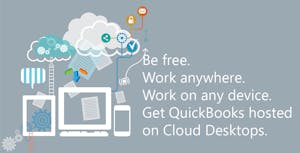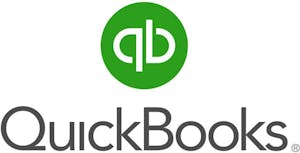If you are using a desktop version of QuickBooks, then your accounting application is hosted and maintained on your computer or your local server. Desktop versions of QuickBooks are only accessible by you and your designated staff from a specific location, which is most likely your office. Moving QuickBooks to the cloud will allow you, your employees, and your accountant to remotely access your accounting application and its data from anywhere an internet connection is available.
 Your data will be accessible to multiple users anywhere, anytime. Cloud-based storage will allow you and your designated users to access your data from any desktop computer, laptop computer, tablet, or smartphone that has an internet connection. Document sharing and real-time editing make collaborating with your staff easier.
You will always have the most recent QuickBooks updates. Your cloud service provider will automatically install the latest releases of QuickBooks for you as they become available.
You will save time. Maintaining computers, software updates, and network configurations is very time-consuming. Moving your QuickBooks data to the cloud will allow you and your staff to outsource some of your business’s IT tasks and free up valuable labor resources.
You will save money. Most cloud hosting services will allow you to scale your plan according to the needs of your business. Using cloud services will allow you to save on data security and IT staffing, as well as hardware and software upgrades. In addition, you will be able to budget your IT expenses without the worry of unplanned expenditures for internal IT problems.
Your data will be accessible to multiple users anywhere, anytime. Cloud-based storage will allow you and your designated users to access your data from any desktop computer, laptop computer, tablet, or smartphone that has an internet connection. Document sharing and real-time editing make collaborating with your staff easier.
You will always have the most recent QuickBooks updates. Your cloud service provider will automatically install the latest releases of QuickBooks for you as they become available.
You will save time. Maintaining computers, software updates, and network configurations is very time-consuming. Moving your QuickBooks data to the cloud will allow you and your staff to outsource some of your business’s IT tasks and free up valuable labor resources.
You will save money. Most cloud hosting services will allow you to scale your plan according to the needs of your business. Using cloud services will allow you to save on data security and IT staffing, as well as hardware and software upgrades. In addition, you will be able to budget your IT expenses without the worry of unplanned expenditures for internal IT problems.
 Intuit, the company that makes QuickBooks, offers versions of the QuickBooks products that have been rewritten specifically for online use. If you choose one of the online versions of the application, your data will be hosted on Intuit servers only. Therefore, you will be dependent upon Intuit for security, support, and availability.
Your most important consideration regarding this format of QuickBooks cloud hosting is that online versions of QuickBooks are different than the desktop versions, and they don’t offer all the same features. For example, unlike the desktop versions, the online versions offer automation options for customer billing, emailing reports, and downloading bank transactions. However, many of the customized features available in the desktop versions are not available online. These include 1099 preparation, tracking mileage and expenses, budgeting, and the ability to customize forms. You should carefully consider the pros and cons of each version before you make the decision to use an online version of QuickBooks.
Intuit, the company that makes QuickBooks, offers versions of the QuickBooks products that have been rewritten specifically for online use. If you choose one of the online versions of the application, your data will be hosted on Intuit servers only. Therefore, you will be dependent upon Intuit for security, support, and availability.
Your most important consideration regarding this format of QuickBooks cloud hosting is that online versions of QuickBooks are different than the desktop versions, and they don’t offer all the same features. For example, unlike the desktop versions, the online versions offer automation options for customer billing, emailing reports, and downloading bank transactions. However, many of the customized features available in the desktop versions are not available online. These include 1099 preparation, tracking mileage and expenses, budgeting, and the ability to customize forms. You should carefully consider the pros and cons of each version before you make the decision to use an online version of QuickBooks.
The Advantages of Moving Your Business’s QuickBooks to the Cloud
How do you know if moving your QuickBooks data to the cloud is the right move for your business? Here are some of the advantages that cloud hosting has to offer: Your data will be more secure. The company that provides your cloud hosting service will be responsible for storing your data securely and redundantly. If your business experiences a power outage, natural disaster, fire, or theft, the availability of your data will not be jeopardized. Your data will be accessible to multiple users anywhere, anytime. Cloud-based storage will allow you and your designated users to access your data from any desktop computer, laptop computer, tablet, or smartphone that has an internet connection. Document sharing and real-time editing make collaborating with your staff easier.
You will always have the most recent QuickBooks updates. Your cloud service provider will automatically install the latest releases of QuickBooks for you as they become available.
You will save time. Maintaining computers, software updates, and network configurations is very time-consuming. Moving your QuickBooks data to the cloud will allow you and your staff to outsource some of your business’s IT tasks and free up valuable labor resources.
You will save money. Most cloud hosting services will allow you to scale your plan according to the needs of your business. Using cloud services will allow you to save on data security and IT staffing, as well as hardware and software upgrades. In addition, you will be able to budget your IT expenses without the worry of unplanned expenditures for internal IT problems.
Your data will be accessible to multiple users anywhere, anytime. Cloud-based storage will allow you and your designated users to access your data from any desktop computer, laptop computer, tablet, or smartphone that has an internet connection. Document sharing and real-time editing make collaborating with your staff easier.
You will always have the most recent QuickBooks updates. Your cloud service provider will automatically install the latest releases of QuickBooks for you as they become available.
You will save time. Maintaining computers, software updates, and network configurations is very time-consuming. Moving your QuickBooks data to the cloud will allow you and your staff to outsource some of your business’s IT tasks and free up valuable labor resources.
You will save money. Most cloud hosting services will allow you to scale your plan according to the needs of your business. Using cloud services will allow you to save on data security and IT staffing, as well as hardware and software upgrades. In addition, you will be able to budget your IT expenses without the worry of unplanned expenditures for internal IT problems.
Using an Online Version of QuickBooks to Move Your Data to the Cloud
 Intuit, the company that makes QuickBooks, offers versions of the QuickBooks products that have been rewritten specifically for online use. If you choose one of the online versions of the application, your data will be hosted on Intuit servers only. Therefore, you will be dependent upon Intuit for security, support, and availability.
Your most important consideration regarding this format of QuickBooks cloud hosting is that online versions of QuickBooks are different than the desktop versions, and they don’t offer all the same features. For example, unlike the desktop versions, the online versions offer automation options for customer billing, emailing reports, and downloading bank transactions. However, many of the customized features available in the desktop versions are not available online. These include 1099 preparation, tracking mileage and expenses, budgeting, and the ability to customize forms. You should carefully consider the pros and cons of each version before you make the decision to use an online version of QuickBooks.
Intuit, the company that makes QuickBooks, offers versions of the QuickBooks products that have been rewritten specifically for online use. If you choose one of the online versions of the application, your data will be hosted on Intuit servers only. Therefore, you will be dependent upon Intuit for security, support, and availability.
Your most important consideration regarding this format of QuickBooks cloud hosting is that online versions of QuickBooks are different than the desktop versions, and they don’t offer all the same features. For example, unlike the desktop versions, the online versions offer automation options for customer billing, emailing reports, and downloading bank transactions. However, many of the customized features available in the desktop versions are not available online. These include 1099 preparation, tracking mileage and expenses, budgeting, and the ability to customize forms. You should carefully consider the pros and cons of each version before you make the decision to use an online version of QuickBooks.
